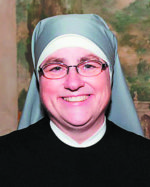Guest Column
By Sister Constance Veit, lsp
 Over Christmas, two of my family members were talking about a mutual friend who, though chronically ill, routinely does heroic acts of kindness for others. Though they get exasperated with her when she overextends herself, they realize that caring for others is what makes life meaningful. I thanked God that these women are kind enough to support their friend through both good times and bad, helping her to live a full life.
Over Christmas, two of my family members were talking about a mutual friend who, though chronically ill, routinely does heroic acts of kindness for others. Though they get exasperated with her when she overextends herself, they realize that caring for others is what makes life meaningful. I thanked God that these women are kind enough to support their friend through both good times and bad, helping her to live a full life.
This incident came to mind as I read Pope Francis’ message for the World Day of the Sick, in which he reflects on St. Bernadette’s relationship to the Blessed Virgin Mary. Our Lady spoke to Bernadette “as one person to another,” he says, treating her with great respect, even though she was poor and sickly.
“This reminds us that every person is, and always remains, a human being, and is to be treated as such. The sick and those who are disabled, even severely, have their own inalienable dignity and mission in life.”
In light of the expanding legalization of assisted suicide, Pope Francis’ insights are invaluable. Studies have shown that the majority of people who support assisted suicide do so because they fear the loss of personal autonomy and dignity in their final days. Suffering, they say, is meaningless and should have no place in the human experience. It seems that the thought of having to go on living when faced with serious disability or illness is becoming unacceptable in our post-Christian society.
What I find most tragic in this exaltation of independence and personal choice is that this attitude denies the beautiful reality that we are made for community. Created in the image and likeness of God, who is a Trinity of Persons, we are inherently relational, not autonomous.
Mutual dependence, rather than independence, is the true Gospel value, and so we should not be ashamed when we need the assistance of others. Our weakness or infirmity can be a graced opportunity for those who help us, as well as for ourselves, for as Saint John Paul II so often repeated, we can only find fulfillment through the sincere gift of self to others.
This is why Pope Francis is asking us to honor the sick by helping them to share their gifts and abilities. “Let us ask Mary Immaculate for the grace always to relate to the sick as persons who certainly need assistance,” he writes, “but who have a gift of their own to share with others.”
St. Bernadette turned her frailty into strength by serving the sick and offering her life for the salvation of humanity. The fact that Mary asked her to pray for sinners, the pope writes, “reminds us that the infirm and the suffering desire not only to be healed, but also to live a truly Christian life.”
Social media has allowed me to become acquainted with numerous heroes who go on giving in the midst of tremendous suffering. If you are looking for inspiration just google Zach Sobiech or Lauren Hill, young adults who made a difference in the world while dying of cancer; J.J. Hanson, president of the Patients Rights Action League, who triumphed over a brain tumor; or O.J. Brigance, a former professional football player who inspires thousands though he is completely paralyzed by Lou Gehrig’s disease.
I am sure that you have unsung heroes in your midst in the person of sick, disabled or elderly persons who enrich your life despite their own trials. This year as we celebrate the World Day of the Sick, let’s honor these everyday heroes by letting them know that we admire them and are there for them in their moments of need, and by asking them to pray for us!
(Sister Constance Veit, lsp, is director of communications for the Little Sisters of the Poor.
